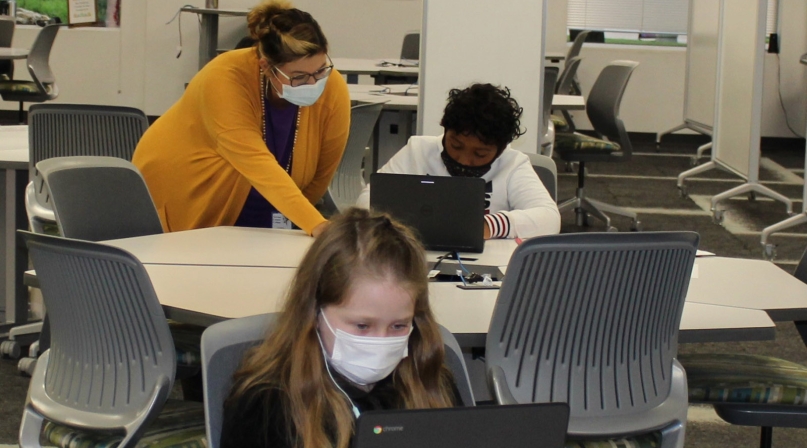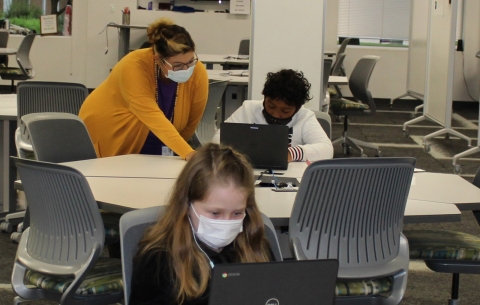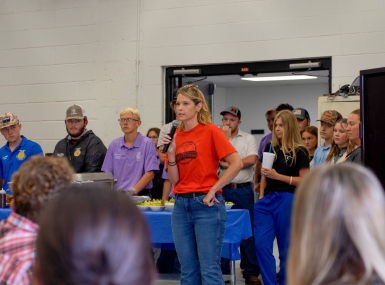Counties step up to provide hubs for childcare, virtual learning
Author
Upcoming Events
Related News

As schools across the country stop in-person classes and switch to hybrid models involving virtual learning, counties are providing alternate options to fulfill the childcare and broadband needs for families with children.
Tarrant County, Texas joined with four agencies to create nine learning assistance sites that will be open for eight weeks through the end of October.
The county approved CARES Act funding to form the Tarrant County School-Age Child Care Collaborative.
“We thought it was essential to assist these children to learn while their schools were closed for in-person instruction,” Tarrant County Commissioner Roy Charles Brooks said.
Parents can send their child to the learning assistance site for $30 per week while the county covers the remaining $170 cost of each child per week.
“We set up this collaborative so that they would have a place to go during the day, could get online with their instructional program and be in an environment where there is a qualified adult to help them get through their learning activities online,” said Brooks, a former NACo president.
Four agencies are involved in the learning assistance sites and include Clayton Youth Enrichment, the Boys & Girls Club of Greater Tarrant County, Girls Inc. of Tarrant County and the YMCA of Metropolitan Fort Worth.
Jason Ray, president of Clayton Youth Enrichment, said there were concerns throughout the county over both childcare and access to adequate internet.
Around 450 students have attended the sites where COVID-19 safety measures are in place and include small group sizes of 10 children per group, face masks and other social distancing measures.
Ray said families did not have to qualify to participate in the program.
“We know families across all income levels could be put in a bind both with their time as well as financially with something that was so unexpected,” he said.
Wicomico County, Md. launched a similar center to help families in the community.
The Kids Klub Learning Center provides childcare for Wicomico County Public School students and similarly has staff supervising students as they follow their virtual curriculums and complete assignments.
James Simmons, recreation superintendent for Wicomico County Recreation, Parks & Tourism, said the parks department typically runs after-school programs in at least eight different locations pre-COVID.
When the school year started and it became clear they would not be able to hold normal programming, the department decided to use their resources to support new needs within the county.
“We realized parents were having to make some really tough decisions to either decide, ‘Am I going to take my kid out of public school and pay for private school so I don’t have to quit my job and stay home?’ or ‘Am I going to quit my job and stay home?’” he said.
Simmons said there was available space to hold a center for children at the county-operated Civic Center, where all events have been cancelled since March.
The learning center targets second through fifth graders. Every day during the week, children eat breakfast, log into their Zoom class, take a break for recess and lunch and have time to play before working on schoolwork or virtually meeting with teachers in the afternoon.
Each student brings their own device but accesses the internet provided by the civic center.
The center is following all COVID-19 protocols with only 13 students and two staff assigned to each classroom. Students do not interact with anyone outside of their group and complete daily temperature checks and symptom screenings.
The county worked with the health department to uses CARES Act funding to lower the weekly cost of the program from $200 to $128.
“I know that the goal is that we can help those families that are at a crossroads and having to make decisions,” Simmons said. “Hopefully this is a way they can do it all and stay at work and have a place for their child to go that’s safe and helps them in their learning.”
The program will stay open as long as there is a need in the community, he said.
Nevada County, Calif. also utilized CARES Act funds to create a distance learning center and youth hub at the Nevada fairgrounds.
“We want to have some place where kids could go that would be COVID-safe so it would have to be a large space and many of our kids in these rural areas are lacking good broadband,” said Nevada County Supervisor Heidi Hall.
The county is leasing the state-run fairgrounds which is mutually beneficial for both county residents and fairgrounds staff since events have been cancelled since March. The space is large enough to follow COVID-19 safety protocols, Hall said.
With lack of broadband a major challenge in the county, Hall said the county is working to provide hot spots at the center to increase broadband capabilities.
The CARES funding will cover the lease through the end of December and the county is providing additional county funds to cover the entire school year.
“They can come into that space to do their homework or kids who are in school can go there after school for youth activities,” she said.
Most schools throughout the county are following hybrid models, she said.
“I think anybody who’s trying to work with their kids at home and teach their kids is very stressed out,” Hall said. “I think it’s going to fill a huge need and be very much appreciated.”

Attachments
Related News

Inland port offers opportunity for Hertford County, N.C.
Hertford County, N.C. doesn’t have a lighthouse, but that hasn’t stopped its economic future from shining thanks to what became known as Project Green Lantern.

Chamber of commerce program helps keep workers on the job
Audrain County, Mo.'s Workforce Resource Assistance Program has helped employers keep staff in place, reducing turnover and promoting stability.

County leadership guides shared prosperity
There’s no chicken-or-egg debate: Economic mobility is not just a byproduct of growth — it is the result of intentional county governance.
